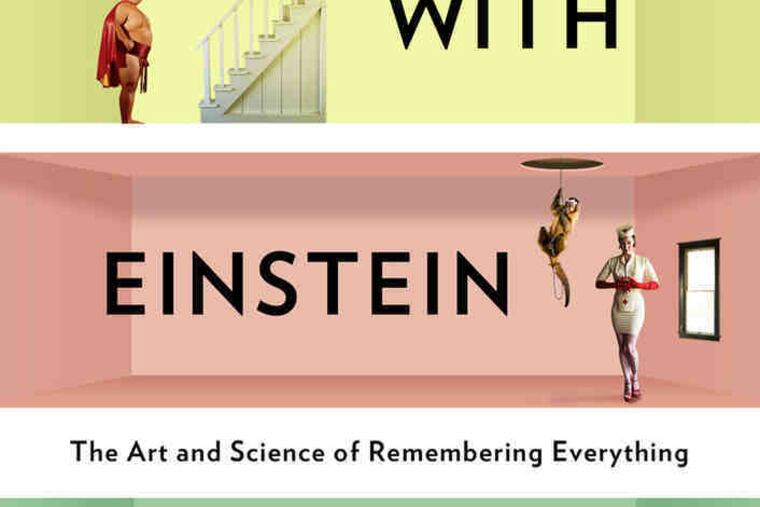Remarkable tome on remembering
The history, psychology, and how-to, by one who trained for the memory championship.

The Art and Science
of Remembering Everything
By Joshua Foer
The Penguin Press. 307 pp. $26.95
nolead ends nolead begins
Reviewed by Steven Rea
Why did I open the refrigerator door? Where'd I put my keys? What was the title of the book that whosie told me about?
Well, the name of that book is Moonwalking With Einstein: The Art and Science of Remembering Everything, and for anyone with even a passing interest in memory - how it works, and when and why it doesn't - Joshua Foer's illuminating investigation into the historical, cultural, physiological, and psychological aspects of human memory is essential reading.
At once a witty, engaging first-person account of a freelance writer with average recall skills who goes on a year-long training regimen to compete in the U.S. Memory Championship, and an illuminating overview of how memory has been used from the time of Simonides to now - when Google has essentially become our default hippocampus - Foer's book is remarkable, and also remarkably practical.
At the outset, Foer explains that this is not a self-help manual. But at the same time, his investigation into the intense-o world of competitive mnemonists, of the aforementioned fifth century B.C. poet's discovery of the "Memory Palace," of Japanese chicken sexers (highly specialized folk who can distinguish female chicks from males by examining the folds in their anal vent), of veteran police detectives and amnesiacs, provides a window into how our brains work, and what we can do to hone our ability to remember.
Memory, Foer writes, was "once a cornerstone of Western culture." In pre-Gutenberg days, the educated and erudite would recite poems and philosophical treatises, but the printed page began to change all that. Internal memories, once imprinted in our brains, could be laid down with movable type. The value placed on memory deflated as the centuries progressed and information became disseminated in books, newspapers, television.
And now, with search engines and smartphones, there really is no need to keep the stanzas of T.S. Eliot's "The Love Song of J. Alfred Prufrock" or Bogey's "hill of beans" speech from Casablanca locked in your noggin.
But memory is more than just a recollection system, more than a storehouse for factoids that will get you on a winning Quizzo squad. In a rather sad and chilling chapter called "The Most Forgetful Man in the World," Foer visits a San Diego octogenarian who was struck with Herpes simplex in 1992. "By the time the virus had run its course, two walnut-size chunks of brain matter in EP's medial temporal lobes had disappeared, and with them most of his memory."
EP, in effect, has permanent amnesia. His disposition is cheerful, his IQ above normal, but on his daily walks around the block he'll greet his neighbors as if they are strangers - he's forgotten that he spoke with them yesterday, and the day before.
"Why bother investing in one's memory in an age of externalized memories?" Foer asks later in his book. Then he thinks of EP, and the absence of context in his life, a void where experiences should be: "The best answer I can give . . . is: How we perceive the world and how we act in it are products of how and what we remember."
The mental athletes Foer meets in Moonwalking With Einstein are, indeed, characters. (Ed Cooke, the long-haired, hard-drinking Brit who becomes Foer's personal trainer, could be played by Notting Hill nutball Rhys Ifans.) And, yes, having the neuron power to memorize 4,140 binary digits in 30 minutes is perhaps a little freakish.
But remembering key events from our childhood, our epic jaunt to India, the restaurant where we proposed to our loved one, the chunk of text from Borges, the lines from Dylan's "Sad Eyed Lady of the Lowlands" - there's substance there, not trickery.
"Competing to see who can memorize more pages of poetry might seem beside the point," Foer says, reflecting on his run in the Memory Championship (you'll have to read the book to see how he fares). "But it's about taking a stand against forgetfulness, and embracing primal capacities from which too many of us have become estranged."
And speaking of primal capacities, what did I do with my hat?